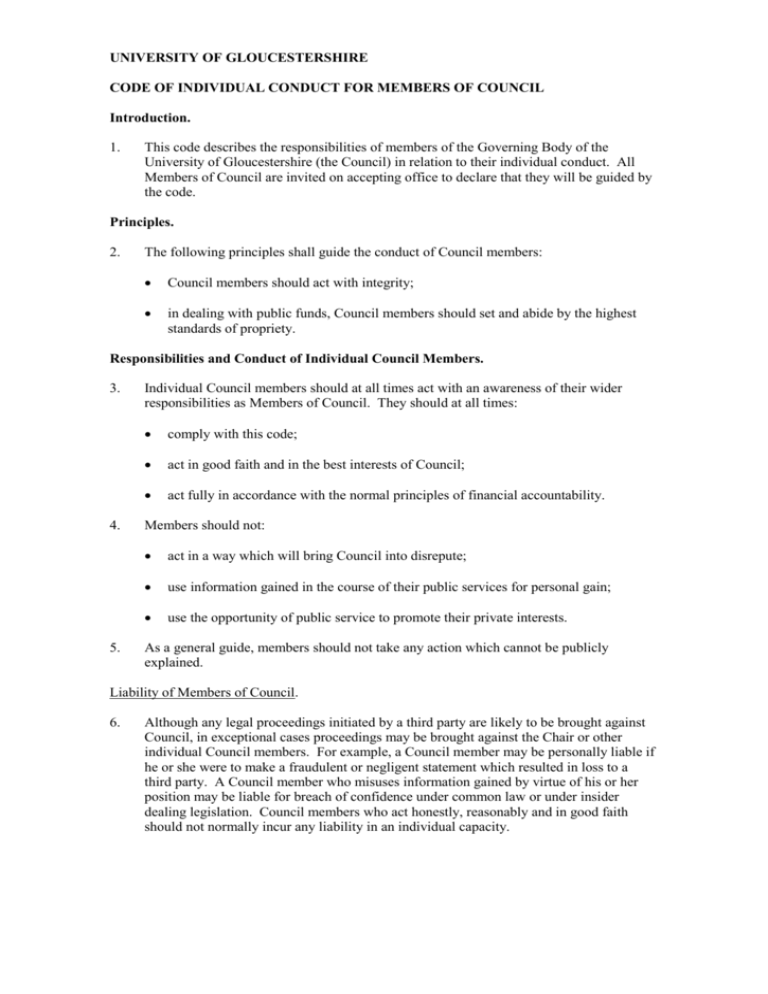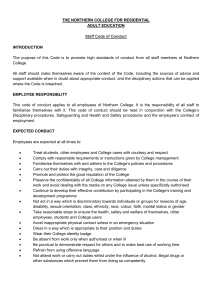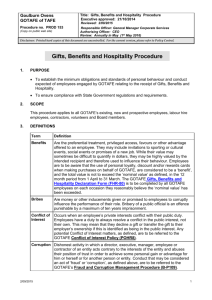Council code of conduct - University of Gloucestershire
advertisement

UNIVERSITY OF GLOUCESTERSHIRE CODE OF INDIVIDUAL CONDUCT FOR MEMBERS OF COUNCIL Introduction. 1. This code describes the responsibilities of members of the Governing Body of the University of Gloucestershire (the Council) in relation to their individual conduct. All Members of Council are invited on accepting office to declare that they will be guided by the code. Principles. 2. The following principles shall guide the conduct of Council members: Council members should act with integrity; in dealing with public funds, Council members should set and abide by the highest standards of propriety. Responsibilities and Conduct of Individual Council Members. 3. 4. 5. Individual Council members should at all times act with an awareness of their wider responsibilities as Members of Council. They should at all times: comply with this code; act in good faith and in the best interests of Council; act fully in accordance with the normal principles of financial accountability. Members should not: act in a way which will bring Council into disrepute; use information gained in the course of their public services for personal gain; use the opportunity of public service to promote their private interests. As a general guide, members should not take any action which cannot be publicly explained. Liability of Members of Council. 6. Although any legal proceedings initiated by a third party are likely to be brought against Council, in exceptional cases proceedings may be brought against the Chair or other individual Council members. For example, a Council member may be personally liable if he or she were to make a fraudulent or negligent statement which resulted in loss to a third party. A Council member who misuses information gained by virtue of his or her position may be liable for breach of confidence under common law or under insider dealing legislation. Council members who act honestly, reasonably and in good faith should not normally incur any liability in an individual capacity. Registration and Declaration of Interests. Register of Interests. 7. It is a commonplace of public life that those with responsibility for decisions, particularly those concerning money, should ensure that they distance themselves from any possibility of a conflict of interest between their personal interests and public responsibilities. Council has introduced a register of the financial and other relevant interests of Council members, which is available for inspection on request to the Clerk of the Council. 8. The register invites members to record as soon as is reasonably practicable after the interest arises: remunerated directorships; remunerated employment, office, profession or other activity; clients connected with higher education or other aspects of Council’s business; gifts and hospitality of a significant value (in excess of £25) arising from membership of Council; shareholdings in a public or private company or body which may give rise to a conflict of interest; miscellaneous, for example: unremunerated posts, honorary positions and other connections which may give rise to a conflict of interest or of trust. Members are invited to record relevant and known interests held by their spouse, partner or close family. Declarations of Interest. Formal business. 9. Any Council member who has a clear and substantial interest in a matter under consideration by Council should declare that interest at any meeting where that matter is to be discussed, whether or not that interest is already recorded in the register of interests. Such declarations should make clear the interest and whether it carries either direct or indirect financial interests to the individual. 10. Where such an interest constitutes a direct or indirect financial interest, the member involved should withdraw from any meeting and not speak, participate in or otherwise seek to influence any decision taken by Council relating to the matter under discussion. 11. Where a member has an interest which is not financial, but which is relevant to Council’s business, that interest should be declared. Where the interest is substantial, the member involved should withdraw from discussions and decisions relating to that interest. Where an interest arises from membership of a public body and where there is no financial interest, full participation in the discussion and decision is permitted. 12. In all circumstances, Council members should ask themselves whether members of the public, knowing the facts of the situation, would reasonably conclude that the interest involved might influence the approach taken to Council’s actions. If so, the interest is sufficient for the member to withdraw. Membership of Committees. 13. Council members should not agree to participate in committees or working groups of Council where there is a clear possibility that a conflict of interest will regularly arise. Informal and other business. 14. Members should apply the same standards regarding the declaration of interests and noninvolvement in relevant business in their dealings with members of Council’s staff and in informal meetings of Council members. Acceptance of gifts and hospitality. 15. Council members should treat with caution any offer or gift, favour or hospitality arising from their membership of Council. In general, meals may be accepted provided that they are working occasions and the apparent costs of the hospitality are reasonable. Attendance at social events and occasions where the invitation is clearly made because of the connection with the Council is also acceptable, although members should not accept lavish hospitality. Care should be taken not to accept hospitality from the same organisation too often or without reciprocal hospitality where appropriate, eg if there is a need for a follow-up meeting or lunch, this should be provided by Council and not by the other party. 16. All gifts beyond the limits set from time to time under the arrangements for the register of interests at paragraph 8 above should be reported to the Clerk of the Council. Where it is not possible to refuse the gift without giving offence, the gift should be accepted on behalf of Council and either surrendered to Council itself and not kept for personal use, or bought from Council at full value. Direct communication by Council members with academic staff 17. The Council’s role is distinct from that of the Executive of the University. Decisions made by the Council must be taken properly through the committee structure it has established for that purpose. It is inappropriate for Council members individually, or in informal groups, to attempt to determine matters outside the Council or committee structure. Equally the distinction between governance and management of the University (through the Vice Chancellor) must be observed and Council members will wish to recognise that they are not responsible for the day-to-day management of the University. Members will legitimately wish to meet staff to increase their mutual understanding of the work of the University and they should be encouraged to do so. Nevertheless, Council members should be careful to ensure that such contacts do not transgress into issues of management and the academic decision making process. In the event of significant issues of concern being brought to the attention of Council members through their links with University staff, the appropriate channel for these is either directly to the Chair of Council or to the Vice-Chancellor. If Council members are uncertain about the action that would be most appropriate to take, advice should be sought from the Secretary to the Council. Confidentiality 18. There should be a general presumption that the principles of openness and transparency will apply to the work of the Council and its committees. The business of the Council (and where appropriate its committees) will be classified as ‘open’, ‘confidential’ and ‘reserved’. Council members are expected to maintain confidentiality at all times regarding matters considered under ‘confidential’ or ‘reserved’ business, and are not permitted to discuss or divulge details of discussions from the meetings or the associated documentation with anybody who is not a member of Council without the permission of Council. There may be occasions when confidential or reserved business is circulated to members outside of a meeting and it is expected that members will follow the same guidelines in those instances. 19. It is vital that the Council and its committees can debate issues fully in order that corporate decisions are taken properly and after frank and open discussion. Council members should have the right to enjoy mutual trust and confidence; members should, therefore, refrain from reporting outside a meeting individual comments or opinions expressed within the meeting. 20. Council members should not make statements to the press or media or at any public meeting that purport to represent the Council’s view, or speak on behalf of the Council, without having first obtained the consent of the Chair, or in his/her absence, the ViceChair. Advice on media enquiries should be sought from the University Press Office. 21. The Chair will be responsible for dealing with any breaches of confidentiality or other problems arising from conduct covered in paragraphs 18 -20, and will take action as appropriate Resolution of difficulties. 22. If Council members have difficulty in complying with this code, or believe that Council is proposing to act improperly, they should raise the issue with the Chair of Council, who will advise on its resolution. I confirm that I agree to abide by this Code of Conduct. Name of Council member: Signature: Date:







